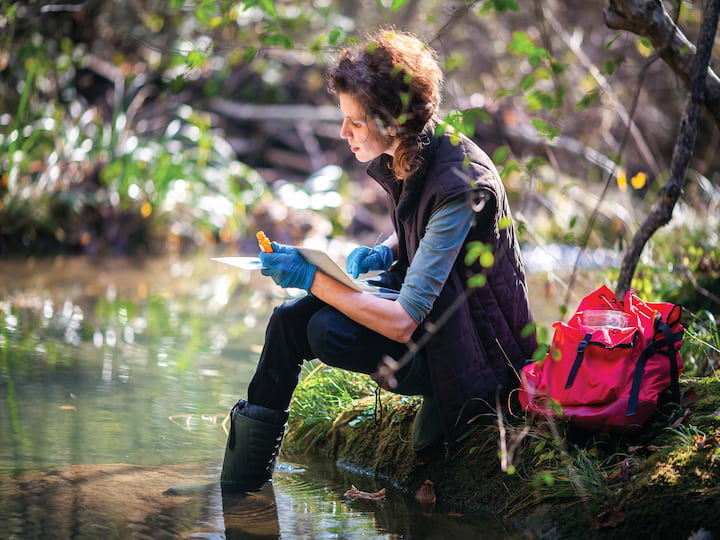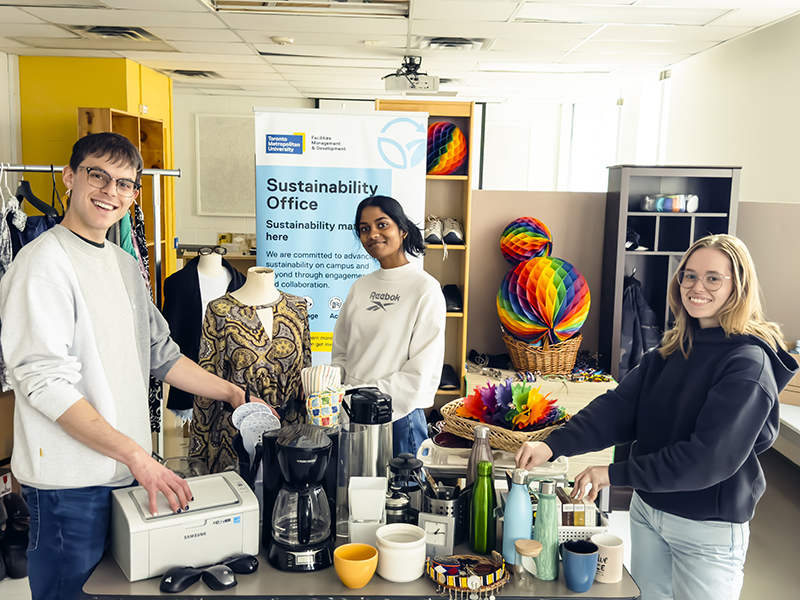SDG 14: Life Below Water


SDG 14: Life Below Water
TMU prioritizes SDG 14: Life Below Water through both academic and research initiatives focused on water governance and sustainability. The university works to advance policies for sustainable water use and to protect aquatic ecosystems. Campus-wide programs have also been implemented to reduce water usage and preserve water quality.
TMU partnered with WWF-Canada to reduce the university’s use of road salt by one third (more than 6 tonnes) to mitigate the impacts on water quality and aquatic ecosystem health.
Our goals in action

TMU offers a wide range of academic opportunities for students to study the sustainable management of water resources and the effects of human activities on aquatic ecosystems. This includes degree programs focused on environmental issues, and fellowships specifically focused on freshwater policy.
- TMU’s Department of Geography and Environmental Studies offers a variety of undergraduate and graduate programs related to responsible water management. These include a BA (Hons) in Environment and Urban Sustainability and MASc and PhD programs in Environmental Applied Science and Management.
- The Geoffrey F. Bruce Graduate and Postdoctoral Fellowships are designed to support the next generation of freshwater leaders, policy researchers and practitioners and increase excellence in public policy to ensure the sustainability of Canada's freshwater resources.
Research at TMU focuses on understanding and protecting aquatic ecosystems through studies on water pollution, wastewater management, and marine resource conservation. TMU researchers are exploring aquatic ecosystems, sustainable fisheries, and marine conservation policies to help protect water resources in Canada and beyond. Our work contributes to global initiatives aimed at preserving biodiversity and ensuring the long-term health of our oceans and other bodies of water.
- Urban Water TMU has numerous projects to find solutions to pressing issues related to wastewater and environmental pollution. The institute also hosts a seminar series open to the public.
- The Spatial Ecology Lab conducts research on land-water ecosystems, urban watersheds and human factors in watershed stewardship to better understand the impact of environmental stressors on species and on ecological functions.
- TMU’s Emerging Contaminants Lab develops innovative methods to further the understanding of the environmental fate and transport mechanisms that govern the behaviour of plastic contaminants in the aquatic environment. Staff at the lab work on interdisciplinary projects ranging from identifying the properties that drive plastic additive patterns in urban waters to the investigation of plastic contaminants in Arctic seabirds.

TMU is committed to sustainable operations by reducing its impact on water through responsible purchasing, efficient water management, and eco-friendly campus practices. The university implements strategies to minimize water waste, improve stormwater management, and reduce pollution. These efforts align with TMU’s broader sustainability goals, fostering a campus culture that prioritizes environmental responsibility.
- TMU Eats is working to increase plant-based and sustainable food options and making improvements to our operations aimed at reducing food-related waste and minimizing our use of single-use plastics. Working with local producers, we’re reducing the carbon footprint of our supply chain and supporting a more sustainable and ecologically conscious food system.
TMU’s Green Labs Program presents an opportunity for lab users to lead by example and implement safe and sustainable solutions to reduce the environmental footprint of their labs. Participants learn about best practices, exchange ideas, participate in events and competitions, and access resources to succeed. Areas covered in the program include sustainable waste management, water conservation, chemical handling, and sustainable purchasing.

Through campus volunteering opportunities, TMU students can actively support environmental conservation efforts, including protecting aquatic ecosystems, while developing leadership skills. Student-led initiatives, clean-up events, and sustainability programs provide hands-on experience in environmental advocacy. These opportunities help students make a tangible impact while deepening their understanding of global sustainability challenges.
- The Sustainability Ambassador Program is a volunteer leadership program open to undergraduate and graduate students. Students work with peers to lead and inspire students, faculty and staff with initiatives, presentations and campaigns that promote sustainability. Work is conducted with guidance from the Sustainability Office and in collaboration with university researchers and institutional partners.
- The Living Planet @ Campus is a project led by World Wildlife Fund Canada (WWF Canada) in partnership with TMU’s Sustainability Office. Living Planet @ Campus allows students to take meaningful actions to protect the environment and improve sustainability practices within their own lives and on campus. The program offers a number of opportunities for students to build their resumés and contribute to positive change, such as community clean-ups, hackathon competitions, and grant funding.
The Living Planet Leader is a self-guided program that allows TMU students the flexibility to choose initiatives that are meaningful to them while building the skills and experiences needed in the field of sustainability. Students can also apply for funding to lead conservation projects at TMU that are in line with the goals of the Sustainability Office.
TMU collaborates with local governments and organizations to maintain clean waterways, assess water quality, and advance research on aquatic sustainability. Through collaborations and community-driven projects, the university helps address pollution, habitat degradation, and conservation challenges. These efforts contribute to healthier water systems that support biodiversity and local communities.
- Urban Water TMU and Facilities Management and Development have partnered with WWF-Canada on a project to reduce the university’s use of road salt in the winter. Reducing the amount of road salt applied to our urban surfaces is key to mitigating the impacts on water quality and aquatic ecosystem health. The university’s groundskeeping team creates a liquid brine solution (a mixture of salt and water) and applies the spray solution to de-ice campus walkways and stairways in anticipation of snowfalls and freezing rain. Using this method, TMU’s annual road salt use is reduced by one third (more than 6 tonnes) on campus and costs are reduced by approximately 30%.
- Urban Water TMU researchers and graduate students from occupational and public health, architectural science, and civil engineering are partnering with Credit Valley Conservation (CVC) to monitor the newly installed Smart Blue Roof on CVC Headquarters in Mississauga. The goal of the project is to assess the real-world performance of the SMART blue roof system with respect to facilitating stormwater retention, assessing public health issues associated with standing water, and monitoring the impact of standing water on the building structure.
- Each year, TMU’s facilities team completes testing of backflow preventers (devices in place to avoid contaminating potable water in water mains). The campus also has 30 premise isolation devices that fall under The City of Toronto BackFlow Prevention Program, which the university tests annually, with results sent to the city.

Stories
